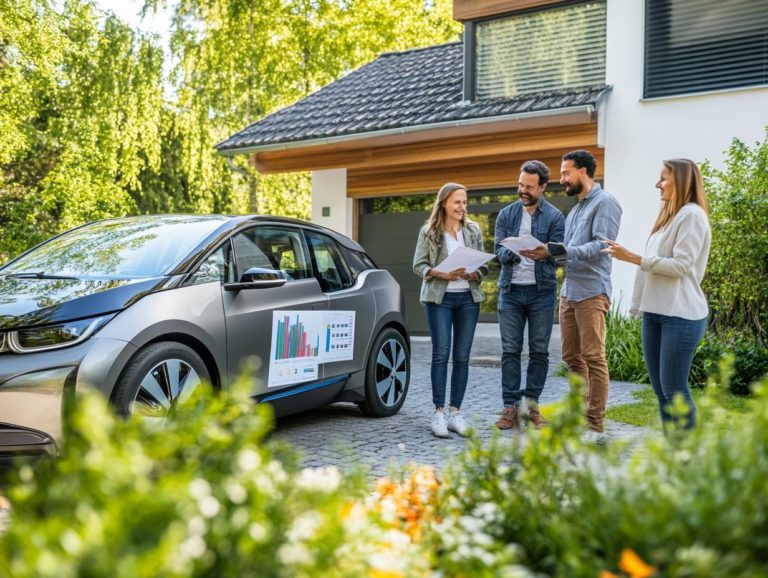How to Determine Your EV Needs
Electric vehicles (EVs) are transforming how we drive, combining cutting-edge technology with a commitment to a cleaner planet!
As you consider switching, it’s crucial to grasp what EVs are and how they function. This guide helps you find your perfect EV by delving into essential factors such as your driving habits, budget, and charging options.
It will also help you calculate your range requirements and select the ideal model that aligns with your lifestyle. Whether you re new to the world of EVs or aiming to upgrade, this comprehensive guide is designed to provide you with all the insights you need.
Contents
- Key Takeaways:
- Understanding Electric Vehicles (EVs)
- Factors to Consider When Determining Your EV Needs
- Calculating Your EV Range Requirements
- Choosing the Right EV for Your Needs
- Frequently Asked Questions
- 1. How do I know if an electric vehicle (EV) is right for me?
- 2. What factors should I consider when determining my EV needs?
- 3. Is an EV suitable for long-distance trips?
- 4. How can I estimate my EV charging costs?
- 5. Are there any incentives or tax credits available for EVs?
- 6. Can I test drive an EV before making a decision?
Key Takeaways:

- Consider your driving habits and commuting distance when determining your EV needs, as this will impact your range requirements.
- Budget and charging infrastructure are important factors when choosing the right EV model for your needs.
- Compare different EV models based on your lifestyle and needs to determine the best fit for you.
Understanding Electric Vehicles (EVs)
Understanding Electric Vehicles (EVs) is essential in today s swiftly transforming automotive landscape, where the shift from fossil fuels to renewable energy sources is accelerating. EVs symbolize a groundbreaking transition in transportation, offering eco-friendly alternatives that significantly reduce carbon emissions and champion clean energy use.
With a wide array of models from manufacturers like Tesla, Ford, and Nissan, the EV market appeals to a broad spectrum of consumer needs. Its adoption is on the rise. By grasping this knowledge, you empower yourself to make informed decisions about vehicle ownership while embracing sustainable driving habits.
What are EVs and How Do They Work?
Electric vehicles (EVs) are your ticket to the future of driving, powered by electric motors and fueled by energy stored in rechargeable batteries, all designed for optimal energy efficiency.
You ll find a variety of models available, including battery electric vehicles (BEVs, which run only on electricity) and plug-in hybrid electric vehicles (PHEVs, which combine electricity and gasoline), each equipped with unique battery capacities that can impact both driving range and overall performance.
When you compare them to traditional cars with internal combustion engines, EVs shine with a significantly lower carbon footprint, producing zero tailpipe emissions.
The significance of effective charging solutions is paramount; they are essential for facilitating the widespread adoption of electric vehicles. You need convenient and accessible options for recharging, whether at home, work, or public stations. This expanding infrastructure not only eases any worries about running out of battery while driving but also propels the shift toward a more sustainable and eco-friendly future.
Factors to Consider When Determining Your EV Needs
When assessing your requirements for an electric vehicle (EV), it’s essential to evaluate several key factors. Consider your driving habits, previous experience with vehicle ownership, budget constraints, and the charging options available to you.
Each of these elements plays a crucial role in ensuring that your choice of EV aligns perfectly with your lifestyle and needs.
Driving Habits and Commuting Distance
Understanding your driving habits and commuting distance is crucial when determining if an electric vehicle is the right fit for you. This consideration becomes especially important when you think about the potential for long-distance travel, as conventional vehicles often have different requirements compared to their electric counterparts.
The range of an EV can significantly shape your decisions, particularly if you frequently embark on longer journeys for work or leisure. Additionally, understanding how to evaluate EV resale value and the availability of charging stations along popular routes also plays a vital role in your decision-making process, ensuring you feel confident venturing beyond your daily routine.
By evaluating both your regular commutes and occasional trips, you can gain valuable insight into what to look for when buying an EV and how it aligns with your lifestyle, ultimately leading you to make a more informed choice.
Budget and Affordability

Budget and affordability are key when purchasing an electric vehicle. Upfront costs can vary widely between different models.
Understanding the total cost of owning a vehicle is essential. This includes more than just the sticker price.
Consider available tax credits these are government incentives that can significantly reduce your initial cost. Electric vehicles often have lower maintenance costs compared to traditional cars, leading to substantial long-term savings.
These vehicles also tend to keep their resale value well in a growing eco-conscious market. Evaluate how these financial aspects fit into your budget for a more economical choice.
Charging Options and Infrastructure
The availability of charging options and strong infrastructure is crucial for owning an electric vehicle. It impacts both convenience and charging speed.
You can choose from various charging setups, like personal home installations or public charging stations in urban and rural areas. Home charging offers unmatched convenience, allowing you to plug in overnight and start the day with a full battery.
Public chargers support your on-the-go needs, making longer trips easier. Faster chargers can dramatically reduce downtime, appealing to more drivers.
As demand for electric vehicles rises, understanding effective charging infrastructure is essential. It enhances your ownership experience and supports this exciting transition.
Calculating Your EV Range Requirements
Calculating your range requirements is crucial for ensuring that the model you choose fits your driving needs. This becomes especially important when considering your daily distances and occasional long trips.
Factors that Affect Range
Several factors influence your electric vehicle’s range, including your driving habits and external conditions. For example, rapid acceleration can drain the battery faster than smoother driving.
Your vehicle’s specifications, such as battery capacity and aerodynamics, also determine how far you can travel on a single charge. Environmental factors, like temperature and terrain, significantly affect performance.
Colder weather can lower battery efficiency, while hilly routes may require more energy. Understanding these elements helps you optimize your vehicle’s efficiency and extend your driving range.
How to Estimate Your Range Needs
Estimating your range needs starts with assessing your typical driving distances and the electric vehicle models that can meet those demands. To better understand your costs, check out how to estimate EV ownership costs. Track your daily commute and any additional trips, such as running errands or spontaneous getaways.
This practice helps you establish an average mileage per day. Also, consider seasonal variations, like summer road trips or winter family visits.
With this data, explore the range specifications of various electric vehicle options available today. This way, you can confidently choose a vehicle that meets your distance requirements and offers the features to enhance your driving experience.
Choosing the Right EV for Your Needs

Selecting the perfect electric vehicle (EV) for your unique requirements demands thoughtful evaluation of different models, driving experiences, and how to evaluate EV range to ensure each option aligns with your lifestyle.
Comparing Different EV Models
Comparing different electric vehicle (EV) models is essential for you as a potential buyer. Manufacturers like Tesla, Ford, and Nissan each bring unique features and performance metrics to the table.
Each brand has its own strengths: Tesla impresses with the Model 3 s remarkable range, Ford offers competitive pricing and versatility with the Mustang Mach-E, and Nissan showcases reliability through the Leaf. As you evaluate your options, consider key specifications such as battery capacity, acceleration times, and available technology features.
While Tesla often leads in range, Ford emphasizes accessibility and user experience, making it particularly appealing for first-time EV owners.
Take the time to evaluate these attributes to empower your decisions as you explore the growing options in electric vehicles.
Considering Your Lifestyle and Needs
Considering your lifestyle and needs is crucial when selecting an electric vehicle. Factors like compact EV options or suitability for suburban driving can greatly influence your choice, so it’s important to explore understanding the different types of EVs available.
For example, if you live in an urban area, you might prioritize smaller, more maneuverable models that shine in tight parking situations and offer efficient energy consumption for those frequent city stops. Conversely, if you’re navigating suburban roads, a larger electric vehicle may better suit your style, providing ample cargo space for family outings and road trips.
Don t forget about practical elements like the availability of charging stations and the length of your daily commute. These factors are key in determining the ideal model for you. Ultimately, grasping these differences empowers you to make informed choices that perfectly align with your driving demands and lifestyle preferences.
Frequently Asked Questions
1. How do I know if an electric vehicle (EV) is right for me?
To determine your EV needs, think about how you’ll use your EV daily and your charging options. If you have a short commute and access to charging at home or work, an EV may be a good fit. For those looking for guidance, learning how to identify your ideal EV can also help. If you frequently take long trips or don’t have reliable charging options, a hybrid or traditional gasoline car may be a better choice.
2. What factors should I consider when determining my EV needs?

In addition to your daily driving habits and charging options, consider the range of the EV, your budget, and any potential incentives or tax credits available for EVs. It’s also important to research the understanding of different EV maintenance needs and the availability and cost of charging stations in your area.
3. Is an EV suitable for long-distance trips?
Many newer EV models have a longer range and can handle longer trips, but it ultimately depends on your personal needs and preferences. If you frequently take long road trips, you may want to consider a hybrid or traditional gasoline car for longer range and faster refueling options.
4. How can I estimate my EV charging costs?
You can estimate your EV charging costs by considering the cost of electricity in your area and the size of your EV’s battery. The average cost to fully charge an EV is around $11, but this can vary depending on your location and your EV’s battery size.
5. Are there any incentives or tax credits available for EVs?
Yes, there are often incentives and tax credits available for purchasing an EV. These can vary by state and may also depend on the specific model of EV. It’s important to research these options and see if you qualify for any potential savings.
6. Can I test drive an EV before making a decision?
Yes, it’s always recommended to test drive any car before making a decision. Many dealerships now offer test drives for EVs, and this can give you a better understanding of how the car handles and if it meets your needs and preferences.
Happy EV hunting!






